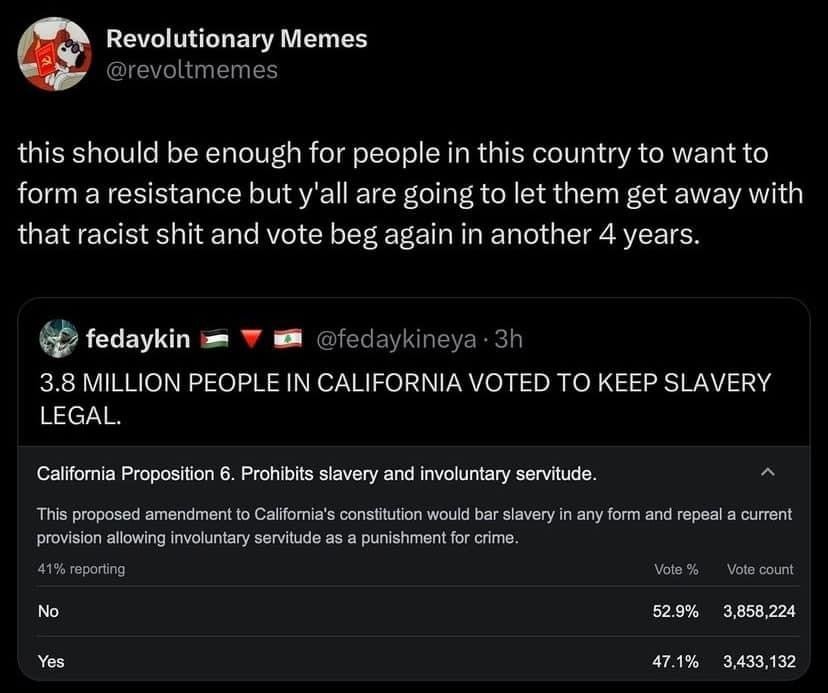this post was submitted on 06 Nov 2024
1 points (100.0% liked)
US Authoritarianism
816 readers
1 users here now
Hello, I am researching American crimes against humanity. . This space so far has been most strongly for memes, and that's fine.
There's other groups and you are welcome to add to them. USAuthoritarianism Linktree
See Also, my website. USAuthoritarianism.com be advised at time of writing it is basically just a donate link
Cool People: [email protected]
founded 8 months ago
MODERATORS
you are viewing a single comment's thread
view the rest of the comments
view the rest of the comments

The thing is: it is not black-or-white but always and heavily depends on context. But let me try to clarify my point of view.
If someone commits a crime and is sentenced to do community service for example, then it is a punishment, yes. In a modern society they are not forced (i.e. with actual psychologic/financial/physical force) but rather given the option to either do community service (or whatever they were sentenced to by the judge, like for example an arsonist has to help rebuilding what they burned down) or chose not to do it. It this case they either have to pay a certain amount of money or they're going to jail instead.
Yes, in two ways. First, it is part of their correction process by giving them a structured day, a responsibility, something to be proud of (like getting a qualification or being able to have some form of apprenticeship helping them to gain a foothold in society, etc., etc.). And second as part of their imprisionment. Also mainly to have a structured day and having them away from their cell so the prison staff can search it for contraband, the cleaning staff to do their work, etc. The prisoners will also get some money from it for being able to buy "luxury goods" in the prison kiosk (i.e. goods that are not provided by the prison, like chocolate, good/better coffee, etc.).
They're also not "forced" to do this. If they decide not to, then they usually get more strict rules, like less "free" time in the courtyard, not allowed to have regular visitors, no day parole, earlier cell confinement and less time to see other inmates, etc.
Forcing someone to do work for you, using physical (threatening with, or using violence), psychological (talk them into doing it, yelling at them, bully them, etc.), or financial (exploiting their poverty) force and/or ignoring safety risks and/or ignoring health issues and risks.
So: inmates are "forced" doing work in the context I described: not slaves. Poor exploited locals building soccer stadiums in Dubai: slaves.
Appreciate you clarifying. I have a better understanding of your views than I did before.
We seem to disagree on what the use of “force” constitutes exactly. In my opinion, having someone have to choose between what most would regard as basic amenities or working as cheap labor for some large conglomerate is considered force.
But, that’s my opinion. And you’re entitled to yours. I’m glad you could explain your position more clearly so that I could understand opposing viewpoints.